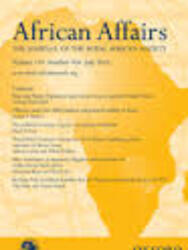Journal Article
Continuity and Change in Senegalese Party Politics
Lessons from the 2012 elections
Senegal's 2012 presidential and legislative elections reaffirmed the country's longstanding reputation as one of Africa's most stable democracies. The elections also represented a critical juncture for the country's party system, demonstrated by the use of new campaign techniques as well as the gradual exit from the political scene of an older generation of elites. At the same time, this article argues, the elections revealed continuing weaknesses within the party system, including low levels of institutionalization and the limited ability of the opposition to mobilize key constituencies, such as underemployed urban youth. These trends are demonstrated through disaggregated election data that show a high degree of electoral volatility and party de-alignment as well as low levels of voter turnout. Thus, while Senegal has now achieved the two rounds of party turnover often deemed to be an important indicator of democratic consolidation, the elections also revealed that a vibrant, pluralistic party system can nonetheless fail to engage citizens over time.
 Join the network
Join the network